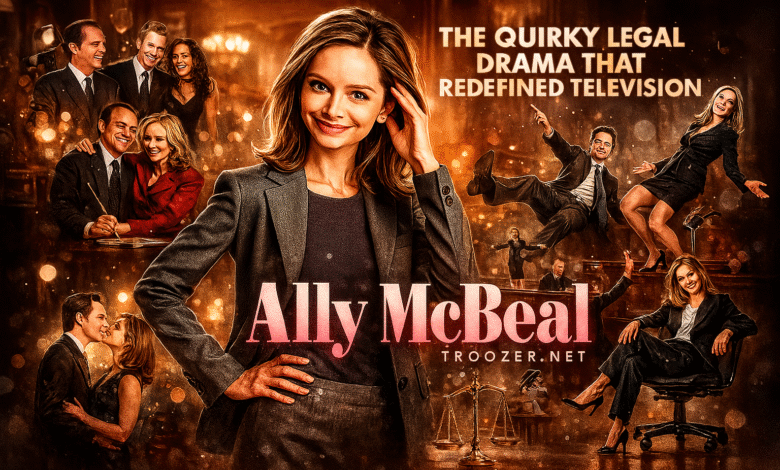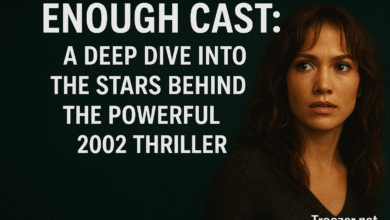Ally McBeal: The Quirky Legal Drama That Redefined Television

When Ally McBeal premiered on Fox in September 1997, television audiences were introduced to something unlike anything they had seen before. A quirky mix of legal drama, romantic comedy, and surreal humor, the show quickly became a cultural phenomenon. Created by David E. Kelley, who was already known for his success with The Practice and Chicago Hope, Ally McBeal took the standard courtroom format and infused it with emotional depth, whimsical imagination, and bold discussions about love, identity, and personal growth.
More than just another legal series, Ally McBeal became a symbol of late 1990s television, blending pop culture with societal questions. Its lead character, played by Calista Flockhart, embodied the conflicts of a young professional woman navigating career ambitions, romantic entanglements, and personal insecurities in an increasingly complex world.
The Premise of Ally McBeal
The series follows Ally McBeal, a young lawyer who joins a Boston law firm where her ex-boyfriend Billy Thomas (Gil Bellows) also works—now married to another colleague. This setup immediately introduced the tension that fueled much of the show’s drama and comedy. Viewers watched Ally wrestle with her feelings, attempt to maintain professionalism, and explore new relationships while balancing the pressures of being a young, ambitious woman in a competitive industry.
The courtroom scenes provided a traditional legal-drama framework, but what set Ally McBeal apart were the surreal cutaway sequences and special effects that visualized Ally’s inner thoughts. For example, a dancing baby—symbolizing her anxieties about aging and motherhood—became one of the most memorable motifs of the series.
Breaking Television Conventions
Ally McBeal stood out because it refused to stick to one genre. While courtroom battles and legal strategies were present, they often served as metaphors for the characters’ personal struggles. David E. Kelley used the show as a platform to explore themes like loneliness, identity, sexuality, and feminism, while still keeping the narrative funny and relatable.
The show also embraced a unique tone by mixing surreal humor with heartfelt emotion. Ally’s daydreams and exaggerated fantasies gave viewers a window into her psyche, making her not just a character but a symbol of the uncertainties faced by many young professionals at the time.
The Ensemble Cast
Though Ally was the focal point, the supporting cast elevated the series to greatness. Richard Fish (Greg Germann), the eccentric co-founder of the law firm, provided absurd comic relief with his bizarre quirks and catchphrases. John Cage (Peter MacNicol), another memorable character, was a socially awkward yet brilliant attorney whose mannerisms made him endearing and unpredictable.
Lucy Liu joined later as Ling Woo, a fierce and unapologetic lawyer who added both spice and controversy to the narrative. The chemistry among the ensemble cast gave the show a lively energy, and their individual quirks reflected the diverse ways people navigate relationships and careers.
Music and Cultural Impact
Another defining feature of Ally McBeal was its music. The series featured singer Vonda Shepard as a recurring bar performer, whose soulful covers of pop classics became the emotional soundtrack of the show. Songs like “Searchin’ My Soul” became synonymous with Ally’s journey, giving the show a distinct identity.
In terms of cultural influence, Ally McBeal sparked conversations about feminism and women in the workplace. Critics debated whether the character represented empowerment or perpetuated stereotypes. Some argued that Ally’s emotional vulnerability and obsession with romance undermined her professional achievements, while others praised the show for portraying women as complex, flawed, and authentic.
Awards and Recognition
The show was a critical and commercial success during its early seasons. It won multiple Golden Globe Awards and Emmys, including Outstanding Comedy Series. Calista Flockhart’s performance earned her significant acclaim, while the supporting cast also received recognition for their contributions.
Ally McBeal became part of the pop culture lexicon. The “dancing baby” was one of the earliest examples of viral internet culture, long before memes dominated online spaces. Phrases and moments from the show entered everyday conversations, cementing its place in 1990s television history.
Controversies and Criticism
The show was not without controversy. Discussions around Calista Flockhart’s appearance fueled debates about body image in Hollywood. Critics also argued that the show sometimes leaned too heavily on romantic subplots at the expense of legal drama. Nevertheless, these criticisms did little to diminish the series’ popularity during its prime.
The Legacy of Ally McBeal
Ally McBeal ended in 2002. By then, it had left an indelible mark on television storytelling. The show paved the way for later dramedies that blended humor, emotion, and surrealism, such as Scrubs and Desperate Housewives.
Ally McBeal remains a fascinating case study in how television can reflect and challenge cultural norms. Its portrayal of modern womanhood, career struggles, and the search for love continues to resonate with viewers who see parts of themselves in Ally’s journey.
Read More: Ripple Price: Trends, Analysis, and Future Outlook
Conclusion
Ally McBeal was more than just a TV show; it was a cultural mirror for its time. By blending legal drama with quirky humor, emotional depth, and surreal fantasy, it created a unique viewing experience that still feels fresh decades later. Whether celebrated for its innovation or critiqued for its portrayal of women, Ally McBeal carved out a lasting legacy in television history.
For fans of television that dares to break boundaries, Ally McBeal remains a must-watch—both as a nostalgic trip to the late ’90s and as a timeless exploration of love, career, and self-discovery.



